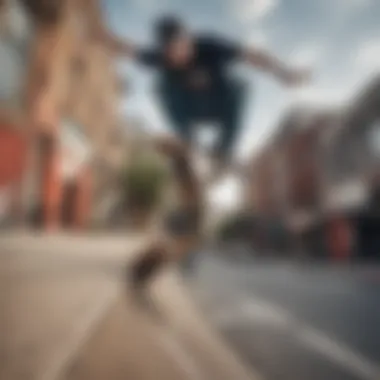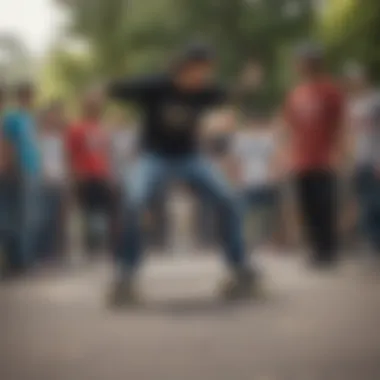The Anti-Hero in Skateboarding Culture: A Deep Dive


Intro
Skateboarding, once relegated to the fringes of youth culture, has grown into a multifaceted lifestyle that values both creativity and rebellion. At the heart of this culture lies the figure of the anti-hero—a character type that defies conventional norms and embraces individuality. In skateboarding, the anti-hero represents a unique blend of skill, attitude, and defiance against the mainstream.
These figures often embody a certain rugged authenticity, attracting attention and admiration from both fellow skaters and outsiders alike. The anti-hero persona invites skaters to challenge limits, break rules, and carve out their own path, creating a narrative that resonates beyond just the act of skating. By examining the historical context of the anti-hero in skateboarding, we can understand how this archetype shapes the perceptions of the sport and its community.
Through introspection and rebellion, anti-heroes have paved the way for future generations of skaters to express themselves freely. They showcase the unrefined artistry of skateboarding, turning the streets into their stage and the board into an extension of their personal identity. This dialogue between rebellion and community lends a powerful nuance to the culture, one that will be explored in depth throughout this article.
Understanding the Anti-Hero
The term anti-hero often elicits a vague understanding rooted in literary and cinematic traditions, but in skateboarding, it takes on a layer of complexity that is all its own. Understanding the anti-hero in this culture reveals not just individual identities but also the underlying philosophies that permeate the skateboarding community. These figures, embodying nuance and stark contrast to conventional heroes, provide a fresh perspective on what it means to be a skater. Delving into their definitions and characteristics offers deeper insight into how these personas shape both skater identity and cultural narratives.
Definition of an Anti-Hero
An anti-hero in skateboarding is essentially a figure who renounces the expectations often associated with mainstream success or conventional heroism. They don't conform; instead, they carve out their identities often contrary to societal norms. Whether it's a reckless disregard for rules, or an innovative, yet unconventional approach to skating, these individuals embody traits that resist the neat boxes typically associated with traditional heroes. They are not always paragons of virtue; rather, they remind us that imperfection is part of the journey.
A classic example might be a skateboarder who pushes the limits not only of skill but of social expectations. They may ride with finesse but exude a rebellious spirit, acting outside the lines of mainstream acceptance. An anti-hero challenges the status quo, forcing the skater community—and by extension, society—to grapple with broader issues like authenticity, creativity, and personal freedom.
Characteristics of Anti-Heroes
Several traits emerge when one considers the characteristics of anti-heroes within skateboarding:
- Rebellion Against Authority: They frequently defy rules and conventions, often viewed as misfits. Whether jumping barriers or skating in forbidden zones, their defiance is a badge of honor that emphasizes personal freedom.
- Individualism: The anti-hero often prioritizes their own vision over conformity. This leads to unique styles, tricks, and an overall approach to the sport, making their skating personal and highly expressive.
- Flawed Morality: Unlike traditional heroes, anti-heroes may engage in questionable actions. This complexity adds depth to their character and resonates with many skaters who often navigate morally ambiguous situations in their lives.
- Risk-Taking: High-flying stunts and daring maneuvers are standard in their skating repertoire. This willingness to take risks extends beyond mere tricks; it becomes a metaphor for their general outlook on life.
- Authenticity: Above all, anti-heroes are seen as genuine. They are unapologetic about who they are and embody a form of honesty lacking in more sanitized representations of success. This authenticity fosters a connection between the skater and their audience.
“It’s not about the medals or the fame; it’s about the journey, the ride, and the real,” as many skaters put it.
Historical Context of Skateboarding
Understanding the historic backdrop of skateboarding sheds light on the evolution of the culture and the rise of its often-revered anti-heroes. Skateboarding didn't just emerge overnight; it was born from a mashup of various influences and circumstances amid changing societal norms. The roots of this sport reflect the ideals and idiosyncrasies of those who rode it, serving as a canvas for expression and rebellion. Through exploring the historical context, we can better appreciate how the anti-hero archetype has developed and solidified its presence in skate credibility.
Origins of Skateboarding
Skateboarding emerged in the late 1940s and early 1950s, initially as a solution to the lack of waves for surfers in California. Surfers began attaching roller skate wheels to wooden planks in an attempt to mimic their surfing on land. This seemingly simple act became a transformative moment, knitting together the threads of surfing and street culture.
By the time the 1960s rolled around, skateboarding began to garner its unique identity. Simple tricks, such as the ollie, started to take shape, igniting a spark of creativity and skill among riders. Additionally, as urban spaces started to develop, skaters made use of sidewalks, banks, and stairs, bridging the divide between sport and art. Notably, it was the youth, much like the anti-heroes they would later come to embody, who embraced the notion of pushing boundaries, often challenging the status quo of who could engage in such undertakings.
- Key Moments in Early Skate History:
- 1940s-50s: Surfing-inspired wooden boards emerge.
- 1960s: The first skateboards are commercially produced.
- 1970s: The arrival of vertical skating sparks creativity.
As skateboarding began to evolve as a sport, it remained intertwined with youth subculture. This not only fostered a sense of belonging but also aligned with anti-establishment attitudes, hallmark qualities of the burgeoning anti-hero narrative.
Evolution of the Skateboarding Culture
The transformation of skateboarding from simple pastime to a global phenomenon is a tale of adaptation and social commentary. As the 1980s rolled in, so did the commercialization of skateboarding, spurred by the rise of skate brands like Powell Peralta and the formation of competitive events. However, this commercialization posed a dichotomy, as the mainstream portrayal often clashed with the raw, gritty nature of street skating.
In the 1990s and early 2000s, the aesthetic of skateboarding further morphed. The advent of better materials and technology gave rise to formidable skaters who pushed the limits, but it was also during this time that the anti-hero's image crystallized in skateboarding culture. Figures like Tony Hawk, with his clean-cut persona, differed dramatically from other skaters embracing a more rebellious vibe. These differences highlighted the contrast between traditional sports heroes and the rugged nonconformity of the anti-hero.
The misuse of public spaces for skating brought both accolades and ridicule. Local councils often found themselves at odds with skaters, resulting in skate parks cropping up as a compromise—a testament to how skaters had made a name on the streets, forcing a conversation on respect and ownership of urban environments.
- Notable Developments in Skateboarding Culture:
- 1980s: Emergence of professional skateboarding and competitions.
- 1990s: Skateboarding's penetration into mainstream media through video games and films.
- 2000s: Growth of skateboarding as a sport recognized globally, with events like the X Games.
With each decade, skateboarding evolved, shaping a narrative that is both reflective and defiant. The roots of anti-heroes took hold, dictating how the world perceived skaters—not merely as athletes but as visionaries, outlaws, and ultimately, icons that resonate with the ethos of rebellion and individuality.
The Emergence of Anti-Heroes in Skateboarding
The rise of anti-heroes in skateboarding marks a pivotal shift in the sport's culture, a shift that intertwines rebellion with admiration. This section not only traces that evolution but also underscores its significance, revealing just how these figures have affected skater identities and broader societal narratives.
From Rebels to Icons
Anti-heroes in skateboarding emerged in a raw cultural environment where skaters often pushed against the constraints of traditional society. Initially branded as outlaws or rebels, these skaters operated on the fringes, challenging norms and expressing themselves through daring maneuvers and artistic styles. They were not just skaters; they were individuals who questioned authority, societal expectations, and even conventional beauty in sport.
The evolution from rebellious skaters to cultural icons is steeped in various social dynamics. For example, a young Tony Hawk was less about the medals and more about how high he could soar off the ramps. He, alongside others, helped shift the perception of skating into a respected sport. During the late '80s and '90s, media began to capture these skaters not merely as renegades, but as champions of an increasingly complex and vibrant subculture.
This transition serves a dual purpose. Firstly, it offers young skaters a glimpse into a world where breaking the mold is not just permissible but celebrated. Secondly, it allows the wider society to engage with their stories, often romanticizing the defiance that lies at the heart of the anti-hero identity. The challenges they faced, such as the struggle for legitimacy, resilience against stereotypes, and the determination to craft a unique narrative, continue to resonate with new generations.
Anti-Heroes in Skateboarding Media
Media representation plays an undeniable role in shaping perceptions of anti-heroes within skate culture. Films, documentaries, and skate videos have immortalized these skaters, framing their journeys in a way that resonates with both skaters and the general public. Films like "Dogtown and Z-Boys" and "Rising Son: The Legend of Skateboarder Josh Stoner" unveil the gritty realities of skate life while painting their subjects as multifaceted characters.
Content published online further enriches this narrative. Platforms like Reddit and Instagram showcase riders' journeys, tricks, and personal stories. These platforms enable skaters to connect, share struggles, and celebrate triumphs in real-time. This community-building aspect amplifies the anti-hero narrative, allowing fans to engage deeply with the culture.
"The anti-hero presents a profound reflection of society, showcasing how those who defy expectations can carve out an identity that others may aspire to."
As a result, anti-heroes in skateboarding media do not merely serve as figures of admiration; they challenge viewers to empathize with the nuances of their struggles, sparking discussions that extend beyond just skating. Whether through social messages about resilience or artistic expression, the portrayal of these characters often leads to societal introspection, influencing how skateboarding is perceived both within the sport and in the broader cultural landscape.
Cultural Significance of the Anti-Hero
The concept of the anti-hero holds a particular weight within skateboarding culture, serving as more than just a mere subversion of traditional hero norms. These figures often embody a unique blend of rebellion, nonconformity, and individuality, which resonates with skaters navigating the complex landscape of their personal identities. Understanding that skaters generally favor authenticity over perfection offers insight into the cultural importance of these anti-heroes. They provide both inspiration and a lens through which individuals can examine their own experiences within the skateboarding community.
Impact on Skater Identity
The identity of skaters frequently intertwines with the anti-hero narrative, where a skater’s choice to embrace flaws becomes a badge of honor rather than a mark of shame. This shift is essential; it encourages a culture that values creativity and self-expression over the quintessential ‘clean cut’ image often glorified in mainstream sports. Skaters like Tony Hawk and Rodney Mullen have become symbols of this identity shift. Hawk's humble beginnings paired with an unyielding determination highlight the real stories behind success, while Mullen’s relentless innovation illustrates the beauty of imperfection.
By continually pushing the boundaries, anti-heroes do not merely attain fame; they cultivate a sense of belonging and uniqueness among those who may not fit into neat categories. The celebration of their quirks fosters an environment where other skaters might feel motivated to share their unique tales without fear of judgment. As a result, skater identity becomes multidimensional, embracing a diverse spectrum of experiences, backgrounds, and aspirations.
Social Commentary Through Anti-Hero Perspectives
Anti-heroes enable a critical examination of societal norms and expectations within the skateboarding culture and beyond. They serve as mirrors reflecting broader societal issues—from questioning authority to critiquing commercialism. Skaters find their narratives deeply intertwined with the anti-hero ethos, utilizing these figures as conduits of social commentary. For example, the documentary Dogtown and Z-Boys showcases how the Zephyr skateboard team broke free from traditional molds, highlighting social issues like class struggle and environmental changes, which resonates profoundly in today's context.
Additionally, anti-heroes challenge the stereotypical view of success. They demonstrate that the path to greatness isn’t a straight line and that setbacks are part of the journey. This perspective encourages an honest dialogue about mental health, resilience, and the sometimes unglamorous realities of pursuing one's passion. By embracing this anti-hero outlook, skaters can address not only their internal struggles but also engage in conversations about broader societal challenges surrounding them.
"The anti-hero is not a perfect role model; they are the flawed beings we can relate to, making room in skate culture for everyone to feel seen."
Incorporating these aspects into skid culture solidifies the anti-hero's role as a cultural keystone. Their significance stretches beyond skating; they manage to encapsulate the spirit of rebellion and authenticity that resonates with anyone seeking a break from conventional narratives.
Notable Anti-Heros in Skateboarding
The world of skateboarding has seen its fair share of individuals who defy norms and challenge conventions, becoming what many label as anti-heroes. These figures not only redefine what it means to be a skater but also shape the cultural landscape surrounding the sport. In this section, we delve into some of the most notable anti-heroes in skateboarding, examining their journeys and contributions. This insight not only highlights their significance but also reflects on how their unique paths influence the skater community today.


Tony Hawk: The Uncommon Journey
Tony Hawk’s story isn’t just about being a phenomenal skateboarder; it’s about standing at the crossroads of commercial success and skate culture authenticity. Derek Jeter might get praise for his elegance on the baseball field, but Hawk brings that same level of finesse to the skateboard. Emerging in the late '70s and early '80s during the sport's formative years, Hawk faced the challenge of transitioning skateboarding from a fringe activity to a respected sport.
The charm of Hawk lies in more than just tricking the board. He represents the struggle of many skaters trying to carve their niche in a world that didn’t quite understand them. His "900" trick, which he landed at the 1999 X Games, isn’t merely a feat of athleticism; it became a defining moment that symbolized passion meeting determination. The pressure he faced leading up to that trick resonates deeply with many skaters grappling with their own fears.
Hawk’s influence extends beyond tricks; he embodies the spirit of skateboarding. He founded the skateboarding video game franchise which brought the sport into homes, profoundly affecting its growth. In fact, his willingness to collaborate with brands while maintaining his roots makes him a quintessential anti-hero – a man truly walking the line between commerciality and authenticity.
Rodney Mullen: The Innovator
Rodney Mullen is a name that rings bells among those familiar with skateboarding. Often referred to as the godfather of street skateboarding, his journey is filled with grit and innovation. Unlike many of his contemporaries, Mullen didn’t just ride the waves of popular tricks; he created them. With his creative approach, he introduced fundamental tricks such as the kickflip and the flatground ollie, which revolutionized the sport.
For Mullen, skateboarding isn’t merely a sport – it’s an art form. His style reflects a deeply personal connection with the board, akin to a painter’s relationship with their canvas. This insight resonates profoundly with those trying to express themselves through the medium of their skateboard. Mullen’s ability to explore, experiment, and expand the boundaries of what’s possible makes him a classic example of an anti-hero. He often felt like an outsider, both within skate communities and mainstream sports, yet his continuous drive to innovate sets him apart.
"Skating is what you make it. Just like life."
— Rodney Mullen
Jason Lee: The Multifaceted Talent
Jason Lee stands out in the skateboard community not just for his skills on the board but also for his versatility in other fields. Besides being a renowned skater, he’s made a significant mark in Hollywood as an actor and filmmaker. His journey illustrates how anti-heroes can thrive across multiple domains, embracing their passions without being boxed in.
Lee kicked off his skating career in the '90s when skateboarding culture was blossoming into the public eye. His ability to connect with a broader audience showcases how anti-heroes challenge conventional paths. While many skaters chose to focus solely on skating, Lee expanded his horizon, breaking away from traditional narratives. He became well-known through characters in shows like My Name Is Earl, which ironically reflect some of the anti-hero traits: flawed yet relatable.
The authenticity he brings to his work, whether it’s skating or acting, reflects a unique trait of anti-heroes – the courage to remain true to oneself, regardless of societal expectations. By merging skate culture with mainstream media, Jason Lee furthers the narrative of anti-heroes, underscoring the importance of multifaceted identities within skater culture.
In summary, each of these figures – Tony Hawk, Rodney Mullen, and Jason Lee – embody the complexities of what it means to be an anti-hero in skateboarding. They not only influence their peers but also set a stage for the next generations to explore their identities and passions within this dynamic culture.
The Anti-Hero’s Legacy
The legacy of the anti-hero in skateboarding is not merely an anecdote to be recounted; it’s a living narrative that continues to shape the very fabric of the skate culture. The anti-hero archetype plays a pivotal role in influencing the ethos of new generations of skaters, inspiring them to embrace individuality and reject conformity. This legacy embodies a spirit that resonates across skateparks and city streets, where the asphalt is often seen as both canvas and battleground.
Influence on Future Generations
The influence of anti-heroes in skateboarding can’t be understated. These figures challenge the norms, advocating for a sense of freedom that transcends the sport itself. Young skaters look up to these unconventional role models, who exude a raw, unpolished energy that is far removed from the pre-packaged personas marketed in various industries.
When we think about individuals like Tony Hawk or Jason Lee, we see more than just skilled athletes; we see trailblazers who have paved the way. Their innovations stirred the pot within the culture, demonstrating that success can spring from rebellion against mainstream expectations. In a world where conformity often seems to reign, their stories present an alternative, urging newcomers to carve their paths in the skateboarding landscape.
Changing Narratives in Skateboarding
Traditionally, skateboarding has been viewed through a lens of competition and discipline, yet the anti-hero figures have reshaped this perception. The narratives surrounding anti-heroes often focus on their struggles, victories, and, sometimes, their failures. This complexity reflects the reality of life itself—it’s not always a win-win situation; lessons often emerge from missteps.
The anti-hero stands as a testament to resilience. By integrating elements of self-expression and a nonchalant attitude towards authority, these figures have contributed to a shift in how skateboarders interpret their cultural identity. As this narrative evolves, it increasingly embraces the diverse motivations that skaters have, whether it be for personal expression, community building, or mere enjoyment.
"Skateboarding is about finding your own style and proving that you’re uniquely you, regardless of what anybody thinks."
Comparative Analysis of Anti-Heroes Across Sports
The discussion surrounding anti-heroes takes center stage not just in skateboarding, but across various sports disciplines. Understanding these figures’ roles reshapes our perception of athletic culture and its grit. Anti-heroes often battle against societal expectations, challenging norms and pushing the envelope of what it means to be a sportsperson. This analysis peels back layers of what defines an anti-hero and draws parallels between their narratives in different sports, highlighting their shared traits and unique cultural reflections.
Common Traits in Various Sports


When we ponder on the anti-hero persona, certain characteristics emerge that are prevalent across sports. These traits not only serve to define these figures but help inform the culture surrounding their respective domains. Here’s a brief rundown of what to look for:
- Rebellion Against Authority: Whether it’s football, skateboarding, or hockey, anti-heroes often scoff at the rules imposed by governing bodies, choosing instead to carve out their own path. This rebellious spirit resonates with audiences who appreciate the rawness that comes with breaking the mold.
- Unorthodox Style and Approach: A key element of the anti-hero is their idiosyncratic method of engaging with their sport. Consider the freestyle BMX riders or the street skaters who utilize unconventional techniques. Their creativity showcases a level of artistry that transforms physical prowess into a form of self-expression.
- Resilience in Adversity: Many anti-heroes have faced setbacks—be it injuries, controversies, or personal struggles. Their journeys often highlight resilience, making them relatable figures to those who admire their ability to rise from the ashes.
- Conflicted Morality: The anti-hero is not the quintessential role model. They may deliver exceptional performances but grapple with personal demons, blurring the lines between right and wrong. This complexity adds depth and engages observers on a more meaningful level.
These shared attributes create a rich tapestry that stitches together the identities of anti-heroes across different sports, connecting their narratives in ways that transcend the differences in their disciplines.
Cultural Reflections in Different Domains
Anti-heroes provide more than just thrilling edge-of-the-seat moments in their sporting contexts. They embody reflections of larger societal issues and values, often influencing cultural dialogues and perceptions. Let’s break these reflections down:
- Identity and Belonging: In every sport, an anti-hero can represent underrepresented groups, providing a sense of belonging to those who feel marginalized. Their stories celebrate individuality, inviting others to embrace their differences. For instance, alternative skaters might connect deeply with someone like Tony Hawk, not just because of his feats but also due to his unstinting individuality.
- Social Commentary: Often, the challenges that anti-heroes face mirror societal problems—racism, class struggle, and systemic issues. A star skater who grew up in a poor neighborhood might turn their struggles into a powerful statement about socioeconomic disparities. Their presence on a national stage becomes a voice for those who are often unheard.
- Our Relationship with Competition: The anti-hero paradigm also questions traditional ideas of competition. In a society that often glorifies winning at all costs, anti-heroes champion the process and the highs and lows that accompany it. They challenge the status quo and force audiences to examine what sportsmanship truly means.
"The true essence of an anti-hero isn’t just about being defiant, but about forging a connection with the hearts of the people, who see their struggles mirrored in their own lives."
Critiques of the Anti-Hero Narratives
The anti-hero narrative has permeated skateboarding culture, presenting figures that often challenge the traditional ideals of heroism. Yet, as their influence grows, critiques also emerge that examine the implications of such representations in a sport known for its creativity and individuality. This section is essential to understand the broader impacts of celebrating anti-heroes, pushing beyond surface-level admiration into serious considerations about values and ethics within skateboarding.
The Topple of the Anti-Hero Myth
The image of the anti-hero—a person who embodies both admirable qualities and significant flaws—can be alluring. However, the glorification of this archetype raises vital questions about morality and behavior within skateboarding and beyond. As skate culture gains popularity, there's a pressing need to dissect how the portrayal of anti-heroes can romanticize reckless behavior.
For instance, the reckless attitude often attributed to renowned skaters can translate into a dangerous ethos that young skaters may idolize. Skateboarding is about freedom and expression, but what happens when that freedom leads to harmful behaviors or choices? The line between admiration and enabling brushed aside. When young enthusiasts look up to skaters who prioritize self-destructive actions or confrontational attitudes, it risks conflating thrill-seeking with irresponsibility.
"There’s a thin veil between inspiration and idolization. What seems rebellious can sometimes be a path to downfall."
Consequently, some argue that the anti-hero's allure is perhaps an outdated concept. The romanticizing of nonconformity can undermine the very foundations of skateboarding, which thrives on creativity and innovation rather than negative behaviors. A critical evaluation of anti-hero narratives can help safeguard skateboarding culture, ensuring it remains a healthy outlet for self-expression.
Ethical Implications of Celebrating Anti-Heros
Delving further into the consequences of the anti-hero narrative, one finds the ethical implications intertwined with cultural values, especially in a domain where youth is often impressionable. While some might argue that anti-heroes embody essential values of authenticity and non-conformity, it raises concerns about endorsing a lifestyle that may lead to societal issues.
The ethics of celebrating such figures include:
- Influence on Youth: Young skaters are in a formative stage, and who they look up to can shape their values and actions. If they idolize anti-heroes, they might adopt behaviors that are more about rebellion and less about community or creativity.
- Normalization of Negative Behaviors: Celebrating an anti-hero can normalize actions that are detrimental—like disregarding personal safety or engaging in illegal activities.
- Diversity in Representation: The anti-hero narrative often features a specific archetype, typically male and often white. This lack of diversity can present an outdated view of heroism in skateboarding, pushing aside the stories of those skaters who lead with positive values.
By looking closely at these ethical concerns, the skateboarding community has the opportunity to reshape the narratives that shape young minds. A shift from the anti-hero to the role of a positive figure can cultivate an environment balanced with daring creativity and responsible actions.
In summary, critiques of the anti-hero narrative expose the layers beneath the rebellious surface of skateboarding culture. It unearths essential dialogues about who gets celebrated and the long-term implications of such reverence. By leaning into those critiques, the community can nurture a culture rich in creativity, responsibility, and true self-expression, shaping a future where skateboarding thrives with integrity.
End
In wrapping up this exploration of the anti-hero within skateboard culture, it becomes evident just how intricate and vital these figures are to the identity and development of the skateboard community. The anti-hero's presence serves as a mirror, reflecting a rebellious spirit and questioning social norms. Their stories resonate with many skaters, making them more than just characters in a narrative; they embody a mindset, setting the stage for an ongoing dialogue about authenticity and personal expression in skating.
Final Thoughts on Anti-Heroes in Skateboarding
The relationship between anti-heroes and skaters runs deeper than mere admiration; it taps into a shared experience of defiance and creativity. Figures like Tony Hawk, Rodney Mullen, and Jason Lee illustrate the diverse paths that can lead skaters to greatness, each story punctuated by challenges and triumphs that resonate with the community. In skateboarding, the anti-hero often finds themselves at the intersection of innovation and rejection of mainstream success. It’s more than just tricks and boards; it reflects a way of life that embraces imperfection and the journey of self-discovery.
Skaters draw inspiration from these icons, transforming their own experiences into something powerful. The anti-hero narrative not only amplifies individual voices but also advocates for a progressive skateboarding world, where authenticity trumps conformity.
The Future of Anti-Heros in Skate Culture
Looking ahead, it’s clear that the anti-hero is not fading away; instead, they are reimagining their roles within a rapidly changing skate culture. With the advent of social media and the internet, new anti-heroes can emerge from unexpected corners. These modern figures will likely continue to challenge existing paradigms, amplifying varied perspectives and lifestyles that may not align with traditional skater archetypes.
While skateboarding becomes more mainstream, the notion of the anti-hero will remain crucial to preserving the essence of what makes skating unique. The future promises even more complex narratives as diverse backgrounds inform new stories, ensuring that the spirit of the anti-hero flourishes.
As we anticipate these shifts, keeping the anti-hero narrative alive will require an active and conscious effort by the skateboard community. Their continued evolution will foster an environment that encourages skaters to embrace their individuality, pushing boundaries both in the sport and in life.















